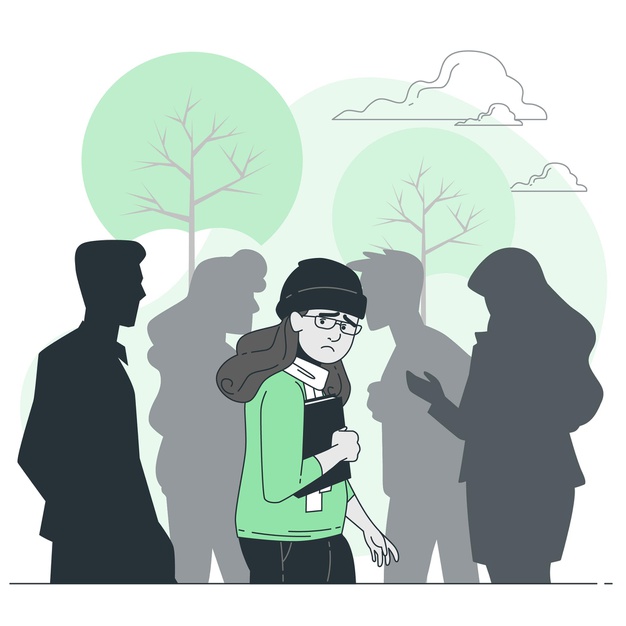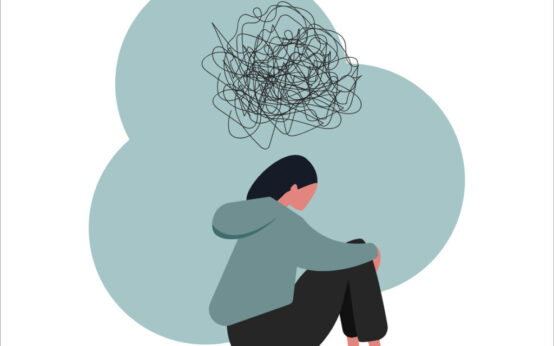A Quick Guide
The pandemic of COVID-19 and the implementation of the lockdown have been hard on all of us, physically as well as mentally. However, for people with social anxiety, the lockdown has been a blessing and a curse. With the world gradually returning to normal, socially anxious people may be experiencing the peak of anxiety symptoms at the thought of resuming socialization.
What is Social Anxiety?
Have you ever dreaded going out and meeting new people? Felt self-conscious and people’s eyes on you so much that you couldn’t enjoy the moment? Did your fear of being judged led you to avoid meeting people altogether?
The majority of people experience this at one point or another during their lives. However, there are people who experience such social anxiety on a regular basis. These intense feelings of fear make doing simple everyday social tasks quite difficult. E.g. Talking to a friend, going out to eat, asking the shopkeeper a simple question, etc.
The severe fear of being judged may develop into a social anxiety disorder if it persists for at least 6 months. Furthermore, if the intensity of symptoms starts to disrupt daily functioning, social relationships, academic, and work life, it is a cause for concern.
The effect of Lockdown on Social anxiety
In order to limit the spread of COVID-19, the public has been expected to stay inside their homes and practice social distancing. In short, people with social anxiety are encouraged or expected to do exactly what endorses their symptoms. For example,
- Minimize face-to-face interaction.
- Keep a 6 feet physical distance while avoiding hugging or any physical contact with others.
- Avoid public gatherings.
- Restrict traveling or going to new places.
- Work and study online.
- Not go out grocery shopping.
These changes may be a sign of relief for many socially anxious people since it means they don’t have to face their fears or experience any social discomfort. However, it also takes away any opportunity for improving the symptoms. Many individuals already suffering from social anxiety may have relapsed and lost their progress due to this. While others with underlying tendencies may have developed their symptoms with such a massive change in our environment and overall lifestyle.
Post-Lockdown Social Anxiety
Currently, governments worldwide are easing the lockdown and the social restrictions, with a reduction in the infected cases. The majority of the people consider this a newfound freedom and look forward to resuming going out, meeting friends, hugging others, etc. Yet, for people with social anxiety, the post-lockdown period may be their worst nightmare.
The return of fear of social interaction and the realization of being back to square one in progress is nothing short of a nightmare. One person experiencing post-lockdown social anxiety summed up her experience by saying:
‘Social anxiety is something I’ve had an experience of in the past. But before lockdown began, I had it in check. So it surprised me when the same old negative, berating thoughts took hold since I’ve been able to see my friends again.’ –Gilgi
Watch: [Social Anxiety | Nia Yoon | TEDxYouth@YCYWShanghai]

How to cope with post-lockdown Social Anxiety
With the post-lockdown period emerging, people with social anxiety can utilize the following coping strategies to transition smoothly:
1. Accept your fear.
Instead of beating yourself up, try to accept that it is normal to feel anxious about meeting friends after so long. You are not alone in this. Many people are experiencing the same feelings you are. So, its okay. Give yourself space to feel such feelings.
2. Share your feelings.
Instead of bottling up your fears, try being open with your loved ones about this difficulty. Tell your friends about how you are feeling and what difficulties you are facing. Consider asking for their help and assistance in transitioning back to the usual process of socialization.
3. Utilize the available options for social interaction in lockdown.
Symptoms of social anxiety reduce with frequent exposure to the feared situation. So, try to use the available options in lockdown for this. Examples may include, calling and ordering food instead of using apps. Going out grocery shopping while taking safety measures. Speaking up in work meetings or school class on zoom conferences. Going out for dinner with family. Going to the park near your house for a walk. Etc.
4. Counter your negative thoughts.
Whenever negative thoughts creep back up, try to counter them with a neutral and more balanced thought. You can make flashcards on which you can write such statements and keep them with you for anxiety-inducing situations. For example, The thought, ‘When I meet my friends, I will say something stupid’ can be reframed to say ‘I have been able to talk openly with my friends before and I will be able to do it again when we meet’.
5. Practice Guided Imagery or visualization strategies.
If you anticipate a situation where you might have to socialize, try to use visualization strategies to prepare for them. You can access these exercises from YouTube. Try to imagine your success and the ability to be calm and casual in these situations.
6. Do Breathing Exercises.
Deep Breathing exercises and progressive muscle relaxation can be used when physiological symptoms of anxiety become too overwhelming. Look up the step-by-step guides for these on the internet. Practice them daily or whenever you feel the need.
7. Focus on your progress.
Instead of focusing on how much progress you have lost, focus on the future and the present moment. Set a daily goal and take baby steps to reach it instead of expecting yourself to leap back into social situations immediately when the lockdown ends.
8. Set an appointment with a therapist.
If you think your symptoms are too severe, consider using psychiatric medication after talking to a doctor. Similarly, psychotherapy and an individualized treatment plan made by a therapist can also be used as treatment options.



 What You Need to Know About Trauma & its effects
What You Need to Know About Trauma & its effects  The Psychology of Stress: Exploring Causes & Coping Strategies
The Psychology of Stress: Exploring Causes & Coping Strategies  6 Effective Strategies to Stop Overthinking
6 Effective Strategies to Stop Overthinking  Trauma and Stressor-Related Disorders: Causes, Symptoms, & Coping Strategies
Trauma and Stressor-Related Disorders: Causes, Symptoms, & Coping Strategies  Overcoming Burnout: A Complete Guide Rekindling the Flame
Overcoming Burnout: A Complete Guide Rekindling the Flame  The Transformative Power of Meditation on Mental Health
The Transformative Power of Meditation on Mental Health